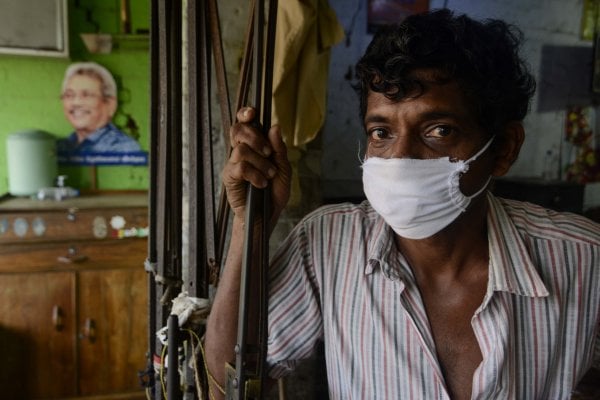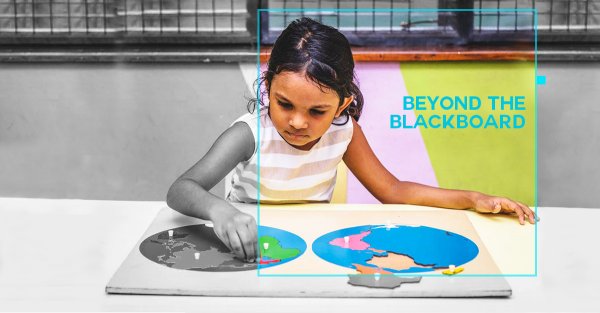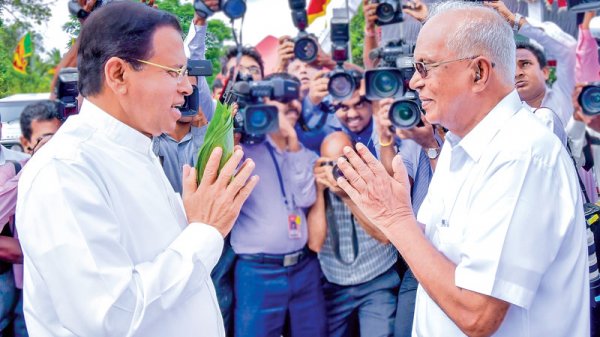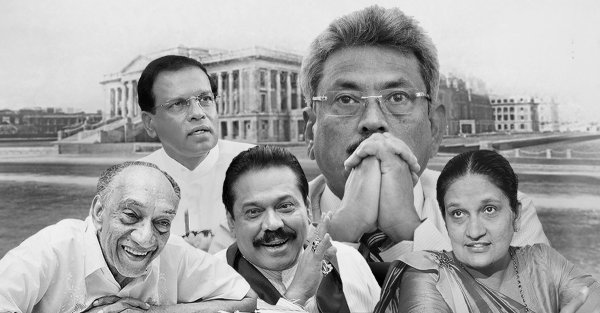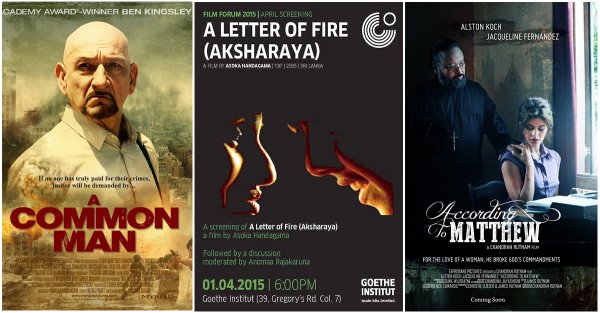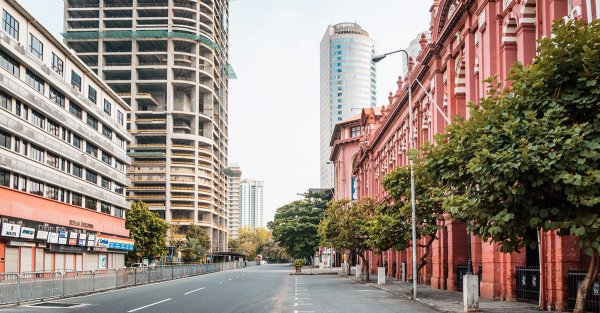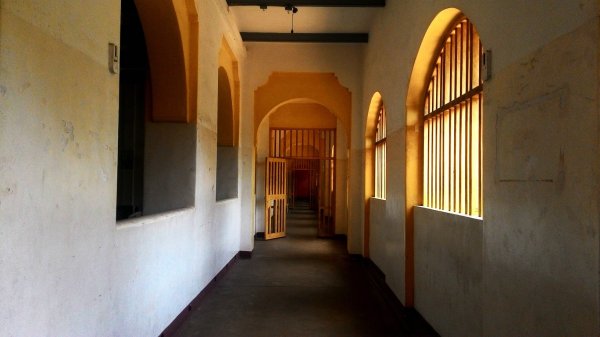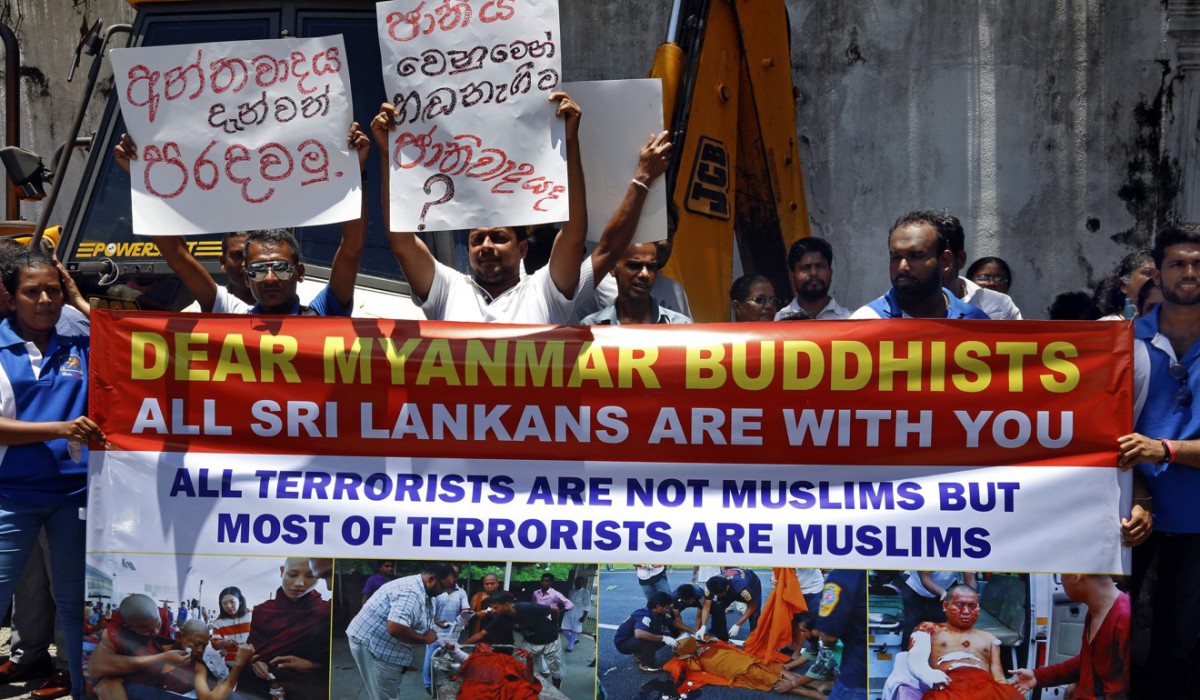
Over the last few weeks, there have been several protests against the Rohingya refugees in Sri Lanka. Led by extremist elements, the group protesting against the refugees held banners and placards expressing solidarity with Myanmar’s de facto leader, Aung San Suu Kyi, and demanded the immediate removal of the asylum seekers who are currently in the country. The situation escalated when the group Sinhale Jathika Balumaluwa led by Buddhist monks, stormed a UN safe-house which sheltered the refugees last Tuesday (26). This, in turn, resulted in their transfer to Boosa, a camp which was used to detain terrorists during Sri Lanka’s civil conflict.
What The Rohingya Are Doing In Sri Lanka
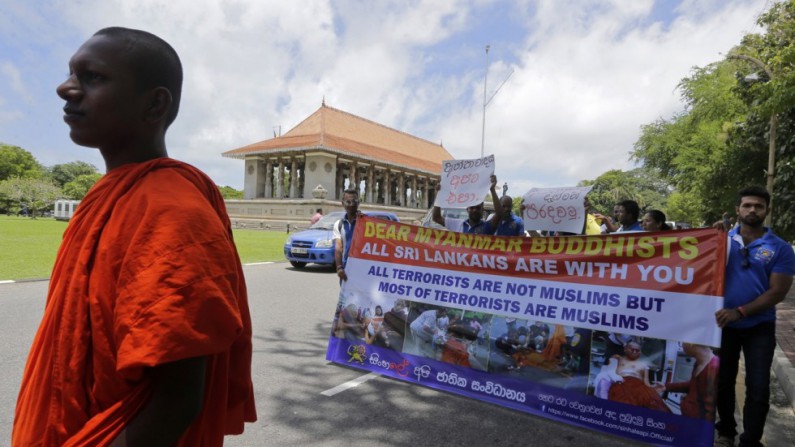
Protest marches against the Rohingya refugees lead by monks in Colombo. Image courtesy defence.pk
Sri Lanka does not have any specific laws concerning refugees, nor does the country allow them to work or integrate themselves into local society. According to a statement released by the Ministry of External Affairs, the Rohingyas currently in the country are those who were rescued off sea, by the Navy. The Ministry also revealed that this is not the first time Sri Lanka has hosted or rescued refugees: the Navy first rescued 55 Rohingyas in March, 2008. They were handed over to the UNHCR, and eventually left the country in July 2012. The next boatload of refugees, numbering 170 persons, were rescued in 2013, and repatriated in 2015. The most recent incident which sparked controversy was the group which was rescued this April, consisting mostly of women and children, including a pregnant woman in critical condition. Similarly, they too were handed over to the UNHCR, and were placed in the safe-house in Mt. Lavinia until they could be resettled in a different country.
In terms of processes, people fleeing their countries and who land in Sri Lanka are eligible to receive refugee-seeker status after registering themselves with the UNHCR. Once their registrations are accepted and completed, they will eventually be issued an asylum seeker certificate. While this does not allow them to work, it does grant them access to healthcare and stipends, and also allows children to enrol in schools.
The Rohingya community who are in Sri Lanka are currently waiting for their refugee status to be processed, and to be repatriated elsewhere. They are not provided for by the government, or taken care of through taxpayers’ money. While there are a few other aid organisations that chip in, the UNHCR provides everything from allowances, to advise, and international protection. Sri Lanka merely happens to be a place of transit.
Safety Concerns

Following the attack on their safe-house, the refugees were escorted to safety. Image courtesy: chrsrilanka.com
Tense situations have been on the rise with protests outside the UN headquarters in Bauddhaloka Mawatha over the last fortnight. This went a step further when the Rohingyas’ safety-house was attacked by a mob, which broke into and entered the complex before causing further destruction within. The UNHCR expressed their alarm at the lack of safety provided to the asylum seekers, and the group was transferred to Boosa on 25 September, a high-security camp in the south, with access granted only to ICRC and UNHCR officials, following the attack against them.
In August, a young Rohingya girl who was seeking treatment at the Kalubowila hospital was allegedly raped by a Sri Lankan police officer. Sources at the hospital state that the alleged victim was admitted for a viral fever and had just been discharged when the incident occurred.
“She was supposed to be taken back to the detention centre, when a male police officer came to collect her and she refused to go with him without a woman constable accompanying them. The officer then assured her that one of the cleaning ladies would be coming with them, and had put the victim on the phone with the lady, who confirmed that it was alright to go with the officer and she would be joining them downstairs. However, the officer had then proceeded to take her to a hotel and kept her overnight before dropping her back at the hospital the next morning,” an official at the hospital told Roar Media.
According to the Centre for Human Rights and Research, the sudden anti-refugee sentiment and riots are the result of a cover up of the alleged rape. The Centre claims that the protest was organised by individuals connected to the police officer who stands accused of rape, and their objective was to deport the chief witness of the incident.
Status Quo

The police eventually arrested and remanded seven suspects. Image courtesy, youtube.com
Justice and legal action has been slow in being meted out. Despite the incident having occurred well over a week ago, the perpetrators were brought to court just recently, with the first arrest being made on 29 September. Seven people have been arrested on charges which includes attacking the police, and creating communal disharmony. The monk leading the protest, Akmeemana Dayarathne Thero, was remanded this Monday (02). Kohuwala Police stated the policeman accused of rape is currently under custody as court proceedings are still underway.
Media Minister Mangala Samaraweera condemned the ‘shameful’ attack against the refugees, calling the attackers “a group of thugs in robes.” Issuing a statement, the minister reiterated that the refugees were rescued at sea and awaiting resettlement, while emphasising that this was not the first time Sri Lanka had rescued and provided shelter for refugees until they were resettled.
Meanwhile, the Bodu Bala Sena (BBS), a hardline group of monks which maintain close ties with Myanmar’s Ashin Wirathu, distanced themselves from the attack, and said that they will be working closely with Ashin Wirathu to ‘bring a lasting solution to this issue.’
Issuing a Facebook statement, the group claimed to understand that Islamic terrorism and Myanmar’s refugee crisis were two separate yet complex issues. “However, Bodu Bala Sena would like to inform you that we neither encourage nor approve acts of that nature. Bodu Bala Sena is on [sic] the firm view that the Buddhists of Sri Lanka should stand up for the rights of Buddhists in Myanmar and the Rohingya refugees should be dealt with in a delicate and lawful manner. We are aware that Sri Lanka has signed a pact with regard to acceptance of refugees into the country, hence, should not contravene the rights of refugees who transitionally arrive in the country. There is a well-established judiciary system in the country that we can place our full credibility on. So, we should let the law of the country deal with the Rohingya refugees according to the existing law,” they added.
In the Buddhist Burmese majority Myanmar, the Muslim and Hindu Rohingya communities are an ethnic minority. Though the community claims to have been in Myanmar for centuries, the government does not recognise them as citizens, thereby leaving them stateless. Violence in the region escalated on 25 August, when militants known as the Arakan Rohingya Solidarity Army (ARSA) attacked an army outpost and killed 12 officials. This triggered violent retribution from the Myanmar government as the military’s response resulted in torched villages and at least 500,000 Rohingya fleeing the country, compelling the UN to call the act a ‘textbook example of ethnic cleansing.’
Cover image courtesy: defence.pk
